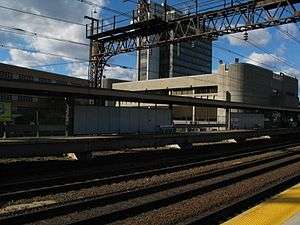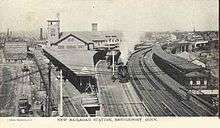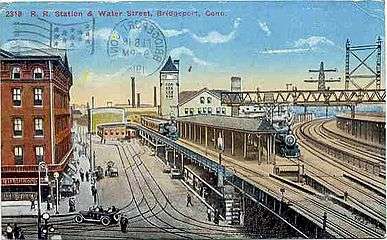Bridgeport station (Connecticut)
Bridgeport is a shared Amtrak, Metro-North Railroad, and Shore Line East train station along the Northeast Corridor that serves Bridgeport, Connecticut and nearby towns. On Metro-North, the station is the transfer point between the Waterbury Branch and the New Haven mainline. Amtrak's inter-city Northeast Regional and Vermonter service also stop at the station, as do Shore Line East trains.[3] In addition the transfer point for Greater Bridgeport Transit Authority buses, the departure point for the Bridgeport & Port Jefferson Ferry across Long Island Sound to Port Jefferson, New York, and both the Arena at Harbor Yard and the Ballpark at Harbor Yard are located adjacent to the station.
It is 55.4 miles (89.2 km) from Grand Central Terminal and the average travel time is 90 minutes.[4]
Opened in 1975, the current station was designed by the local architectural firm of Antinozzi Associates.[1] Unusually, the station spans the six lanes of Water Street, with the passenger waiting room located over the roadway. The simple concrete facades are scored with vertical lines or channels to create a textured surface. Throughout the day, as the sun rakes across the walls, the channels—of varying depth and width—produce a range of ever-changing shadows. Boxy in appearance and punctuated by rectangular windows, the station’s angularity is softened by the rounded edges of the access towers.[1]
Station layout
This station has two high-level side platforms, each eight cars long. The western platform, adjacent to Track 3, is generally used by westbound Metro-North trains and southbound Amtrak trains. The eastern platform, adjacent to Track 4, is generally used by eastbound Metro-North trains and northbound Amtrak trains. Waterbury Branch trains use either platform.
The New Haven Line uses four tracks at this location. The two inner tracks, not adjacent to either platform, are used only by express trains.
| P Platform level |
Side platform, doors will open on the right | |
| Track 3 | ← Waterbury Branch termination track ← New Haven Line toward Grand Central (Fairfield Metro) ← Vermonter toward Washington, D.C. (Stamford) ← Northeast Regional toward Northern Virginia (Stamford) ← Northeast Corridor services do not stop here | |
| Track 1 | ← Northeast Corridor services do not stop here | |
| Track 2 | Northeast Corridor services do not stop here → | |
| Track 4 | Northeast Corridor services do not stop here → Northeast Regional toward Boston or Springfield (New Haven) → Vermonter toward St. Albans (New Haven) → New Haven Line toward New Haven or New Haven–State Street (Stratford) → Waterbury Branch toward Waterbury (Stratford) → | |
| Side platform, doors will open on the right | ||
| G | Street level | Exit/entrance and parking |
History
The current station in Bridgeport was fully completed under ConnDOT and Penn Central in 1975. It replaced a large, ornate structure built in 1905, located to the north of the current station at 41°10′52″N 73°11′15″W / 41.181206°N 73.187535°W. The relocation was occasioned by the introduction of "Cosmopolitan" M-2 railcars which could only board at high-level platforms, the installation of which was impractical at the old station due to the curvature of the platforms. The older station was razed in the 1980s.
A branch line, originally built by New Haven Railroad predecessor Housatonic Railroad to Trumbull, Monroe and Newtown, used to join the main tracks at the old Bridgeport station. All evidence of this junction is now gone, but the related bridges of this line existed near Bridgeport station until the 1990s. Evidence of this line is still visible further north, including a rail bridge crossing the Merritt Parkway near the Route 25 exits, and a rail trail that extends from Trumbull to the Newtown - Monroe town line.[5]
Bridgeport was also close to the scene of three of Connecticut's worst train accidents. The first occurred on July 11, 1911 about a mile west of the station, near where Fairfield Avenue (CT 130) passes underneath and I-95 currently passes overhead. Fourteen people were killed and 40 injured in the disaster; excessive speed through a crossover was the cause.[6] The second occurred on July 14, 1955 due to excessive speed on a sharp curve approaching the station; one person was killed and 58 were injured.[7] Both accidents involved the same train, the northbound Federal Express overnight train from Washington, D.C. to Boston. The third wreck, involving the derailment and sideswiping collision of two Metro-North trains, occurred on May 17, 2013, close to the same location as the 1911 wreck, injuring 60 passengers on both trains.[8] A track defect was suspected pending completion of an investigation.[9]
Ridership
As of August 2006, average weekday commuter ridership was 3,120 passengers. Bridgeport is the busiest Metro-North station between Stamford and New Haven's Union Station.[10] The station has 1,453 parking spaces, with 950 owned by the state.[11]
References
- 1 2 3 Great American Stations. Accessed March 1, 2013.
- ↑ "Amtrak Fact Sheet, FY2017, State of Connecticut" (PDF). Amtrak. November 2017. Retrieved 23 December 2017.
- ↑ There is no Amtrak ticket office at the station, but there are "Quick-Trak" machines accessible during station hours."Bridgeport, CT (BRP)". Retrieved July 27, 2008.
- ↑ "New Haven Line Timetable" (PDF). Metro-North Railroad. January 2018. Retrieved January 28, 2018.
- ↑ "Regional Bicycle Trail". Archived from the original on 2007-10-11.
- ↑ Belnap, H. W. "Report No. 6: The New York, New Haven and Hartford Railroad in re Accident at Bridgeport, Connecticut, July 11, 1911" (PDF). Interstate Commerce Commission accident reports. U.S. Department of Transportation. Retrieved June 16, 2012.
- ↑ "Report No. 3642: The New York, New Haven and Hartford Railroad in re Accident at Bridgeport, Connecticut, July 14, 1955" (PDF). Interstate Commerce Commission accident reports. U.S. Department of Transportation. Retrieved June 16, 2012.
- ↑ Matt Flegenheimer; Robert Davey (May 18, 2013). "Metro-North Trains Collide in Connecticut; Dozens of Injuries Are Reported". New York Times. Retrieved May 23, 2013.
- ↑ Cassidy, Martin B. (May 24, 2013). "NTSB releases findings into Metro-North derailment". Stamford Advocate. Retrieved May 24, 2013.
- ↑ "www.nytimes.com/packages/html/nyregion/commutemetro-north.html". New York Times. Retrieved August 27, 2008.
- ↑ Task 2: Technical Memorandum parking Inventory and Utilization: Final Report" submitted by Urbitran Associates Inc. to the Connecticut Department of Transportation, "Table 1: New Haven Line Parking Capacity and Utilization", page 6, July 2003 Archived July 12, 2007, at the Wayback Machine."
External links
![]()
- Amtrak – Stations – Bridgeport, CT
- Bridgeport (BRP)--Great American Stations (Amtrak)
- Bridgeport Amtrak Station (USA Rail Guide -- Train Web)
- Water Street entrance from Google Maps Street View


